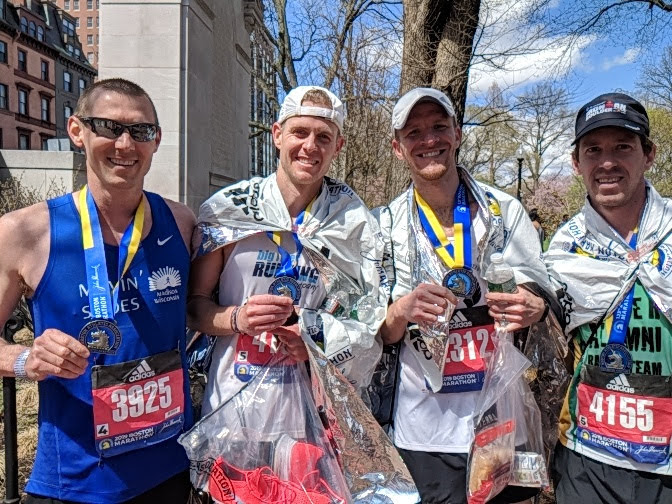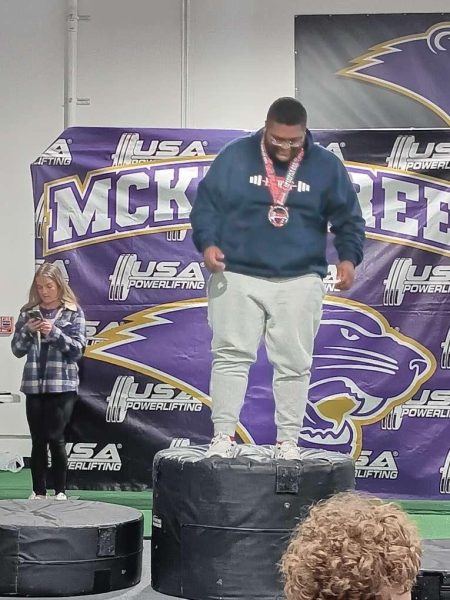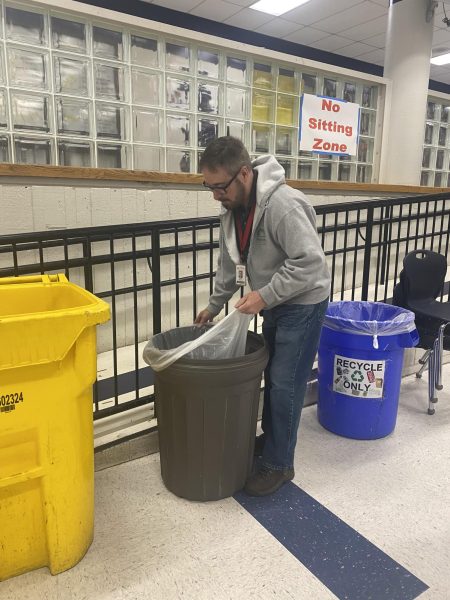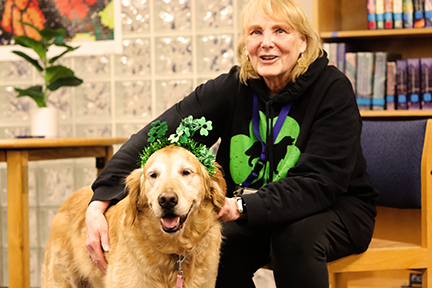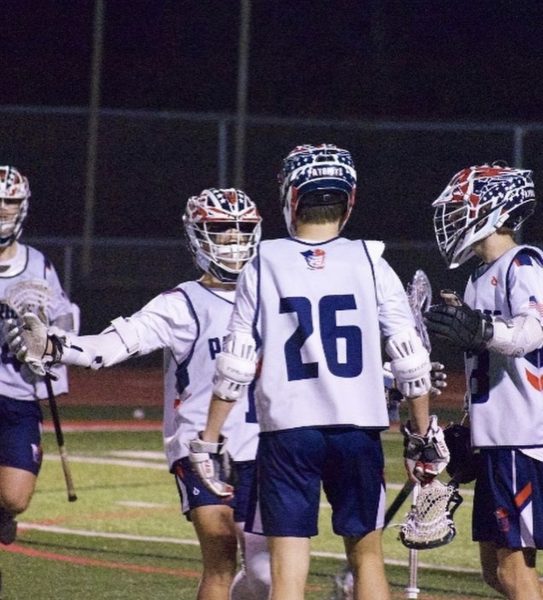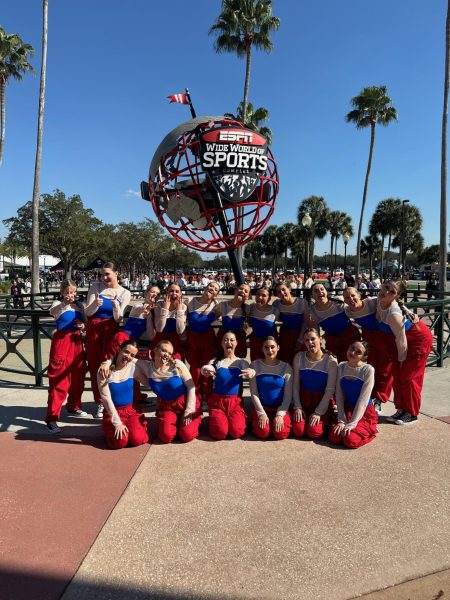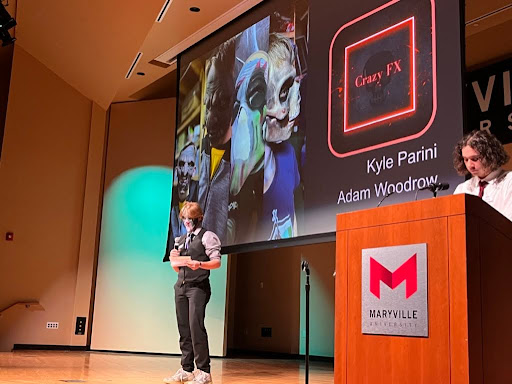Roach conquers Boston
P.E. teacher Matt Roach competes in Boston Marathon.
Matt Roach smiles with his friends after finishing the Boston Marathon.
Do you think that you could run a mile in under six minutes and 15 seconds? How about two miles at that pace? Even five miles maybe? As outrageous as it may sound, South P.E. teacher Matt Roach was able to sustain a 6:14 mile pace for 26.2 miles at the 123rd Boston Marathon on April 15. His finishing time was 2:45.49.
The word and race “marathon” originates from Greek history, where a soldier named Pheidippides ran from near the town of Marathon to Athens, roughly 26 miles, to announce the defeat of the Persians. Since then, completing a marathon is a large milestone in a runner’s career and a great accomplishment. The race was first introduced in the 1896 Olympic Games, held in Athens.
People have lots of reasons for finishing marathons or races. Michael Fussner, a ’93 South graduate, also competed this year at Boston, and had motives different than most.
“My father was my biggest motivation on this journey. He passed away while I was running my qualifying marathon and has helped me push through my troubles,” said Fussner.
Others, such as Roach, run the marathon to continue to push himself.
“I am my own biggest motivator. I wake up every morning and try to go farther, faster, and harder to make myself better,” Roach said.
Training for a marathon requires patience and is a tedious process. Many miles and hours of dedication are poured into becoming better.
“I would wake up at exactly 4:44 a.m. every day before school. I’d meet my partner out on the roads and we’d go to work, pounding the pavement for countless hours,” Roach said. “Every week, I hit around 70-75 miles a week. To achieve that goal, I’d even run twice a day sometimes. ”
“Training generally consisted of around 65 miles a week, including a speed workout day, a tempo run, and a long run to round out the week on Sundays,” Fussner said.
Sleep is important for runners, especially during high school running. When asked about sleep, sophomore James Stone prioritized sleep over most things.
“I like to get around nine hours of sleep everyday. Sleep is extremely important to reset the body and give yourself the rest needed,” Stone said.
Unlike Stone, Roach was a little less passionate about sleep. But with five kids and getting up before sunrise, it is hard for him to get as much sleep as Stone.
“I normally get around 6.5 hours of sleep, sometimes more, sometimes less,” Roach said.
Another difference between high school and marathon racing is the distance. In high school, the longest race in cross country is a 5K (or 3.11 miles), while runners out of high school can find numerous races of varying distances, such as a marathon or even something longer. When Stone was asked whether he would ever run a marathon, he gave a very direct answer.
“I don’t think I’d ever be able to complete a marathon, nevertheless enjoy running for that long,” Stone said.
The scenic course is notorious for “Heartbreak Hill,” the hardest part of the course. Athletes struggle up this incline and it can become demoralizing. Even Roach felt defeated once finishing the climb.
“Heartbreak Hill, around mile 22, is the worst part of the race and your body starts to really feel the fatigue and pain set in,” said Roach.
Although the whole 26.2 miles can be grueling and difficult, runners from all around the world love the atmosphere and fans lining the course.
“I have never experienced so many people out cheering runners. I tried to reciprocate their enthusiasm with as many high fives as I could,” Fussner said. Even though he stopped and interacted with fans, Fussner was able to sustain a 6:32 average pace.
Stone said he loves racing both cross country and track, and he runs for the feeling after.
“To finish a race feels relieving and great. It’s an unexplainable rush you get,” he said.
That feeling of finishing the race may seem exhilarating, relaxing, and amazing in high school, but once out of school, it can also leave athletes with a strange feeling.
“I didn’t really think of how I finished. It was all about getting to that point. Just being able to look around and see all the others around you that are just as good as you is humbling and still crazy to believe that I was able to qualify with all these prestigious runners,” Roach said.
“Finishing such a momentous race leaves me with the question, ‘What now?’” Fussner explained, describing his mixed emotions after the marathon.
Running is hard and sometimes frustrating. Runners often get the question asking why they run. When asked the question, all three of them had different ideas and thoughts.
“I run for the fun of the sport and getting the feeling of satisfaction when I finish a run. I like the community running gives and getting to develop new relationships with people,” said Stone.
“Running is freedom. The ‘runner’s high’ after a good workout can’t be matched,” Fussner said.
“Running takes you out of your comfort zone, and I love that. Competition continually refuels my drive for running even at my age. And above all, it’s one of the purest ways to keep yourself healthy,” said Roach.

